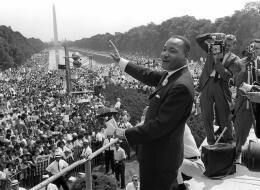The New Jim Crow
African Americans, Featured — By Michelle Alexander on February 10, 2010 at 16:07It’s that time of year again, when we hear Martin Luther King, Jr.’s speeches in 10 second clips, the same clips that get recycled on an annual basis now — radical proclamations that have been reduced over the years to mere platitudes. His booming voice declares that he’s been to the mountaintop and has glimpsed the promised land. He has a dream, he says, and his voice soars.
During this year’s Black History Month, like last, we will be treated to celebrations of Obama’s presidency — the ultimate symbol, we are told, of America’s triumph over its ugly history of discrimination, exclusion, and racial caste. This is a time to rejoice, it is said, though we still have a long way to go.
That is the dominant racial narrative today among those who claim to care about racial justice: Look how far we have come, but yes we still have a long way to go.
Here are a few facts that run counter to that racial narrative:
* There are more African Americans under correctional control today — in prison or jail, on probation or parole — than were enslaved in 1850, a decade before the Civil War began.
* As of 2004, more African American men were disenfranchised (due to felon disenfranchisement laws) than in 1870, the year the Fifteenth Amendment was ratified prohibiting laws that explicitly deny the right to vote on the basis of race.
* If you take into account prisoners, a large majority of African American men in some urban areas, like Chicago, have been labeled felons for life. These men are part of a growing undercaste — not class, caste — a group of people who are permanently relegated, by law, to an inferior second-class status. They can be denied the right to vote, automatically excluded from juries, and legally discriminated against in employment, housing, access to education, and public benefits — much as their grandparents and great-grandparents once were during the Jim Crow era.
There is a colorblind explanation for all this: crime rates. But crime rates do not explain the sudden and dramatic mass incarceration of African Americans during the past 30 years. Crime rates have fluctuated over the past few decades — and currently are at historical lows — but imprisonment rates have soared. Quintupled. And the vast majority of that increase is due to the War on Drugs, a war waged almost exclusively in poor communities of color, even though studies consistently show that people of all colors use and sell illegal drugs at remarkably similar rates. In fact, some studies indicate that white youth are significantly more likely to engage in illegal drug dealing than black youth.
That is not what you would guess, though, when entering our nation’s prisons and jails, which are overflowing with black and brown drug offenders.
The clock has been turned back on racial progress in America, though scarcely anyone seems to notice. All eyes are fixed on people like Barack Obama and Oprah Winfrey who have defied the odds and achieved great power, wealth and fame.
But what if Obama, who has admitted to violating our nation’s drug laws, had been treated like a common criminal — what if he hadn’t been insulated by growing up in Hawaii and attending a predominately white university — where would he be now? Most likely, he would be cycling in and out of prison, trapped in the parallel social universe that exists for those labeled felons. Far from being president of the United States, he might be denied the right to vote. He would be subject to many of the same forms of discrimination, stigma, and social exclusion that we supposedly left behind. How many black men and boys are trapped in this undercaste who might have been president of the United States? We will never know.
This is not Martin Luther King, Jr.’s dream. As described in The New Jim Crow: Mass Incarceration in the Age of Colorblindness the cyclical rebirth of caste in America is a recurring racial nightmare.
Tags: Barack Obama, Black History Month, Books News, discrimination, Martin Luther King, prison, racism, slavery, The New Jim CrowAuthor: Michelle Alexander (4 Articles)

A longtime civil rights advocate and litigator, MICHELLE ALEXANDER won a 2005 Soros Justice Fellowship and now holds a joint appointment at the Kirwan Institute for the Study of Race and Ethnicity and the Mortiz College of Law at Ohio State University. Alexander servec for several years as director of the Racial Justice Project at the ACLU of Northern California, and subsequently directed the Civil Rights Clinics at Stanford Law School, where she was an associate professor. Alexander is a former law clerk for Justice Harry Blackmun on the U.S. Supreme Court and has appeared as a commentator on CNN, MSNBC, and NPR. The New Jim Crow is her first book.



 Share This
Share This Tweet This
Tweet This Digg This
Digg This Save to delicious
Save to delicious Stumble it
Stumble it





 The choice between Sandlin and Noem is quite clear
The choice between Sandlin and Noem is quite clear And a child shall lead them
And a child shall lead them








1 Comment